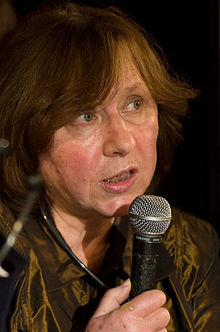Svetlana Alexievich
Appearance

Svetlana Alexandrovna Alexievich (born May 31, 1948) is a Belarusian investigative journalist and prose writer. She is the recipient of the 2015 Nobel Prize in Literature.
| This article on an author is a stub. You can help out with Wikiquote by expanding it! |
Quotes
[edit]- What can art accomplish? The purpose of art is to accumulate the human within the human being.
- Speech at the Nobel Banquet (10 December 2015)
Voices from Chernobyl (2005)
[edit]- Death is the fairest thing in the world. No one's ever gotten out of it. The earth takes everyone—the kind, the cruel, the sinners. Aside from that, there's no fairness on earth.
- p. 27
- Is there anything more frightening than people?
- p. 60
- I used to think I could understand everything and express everything. Or almost everything. I remember when I was writing my book about the war in Afghanistan, Zinky Boys, I went to Afghanistan and they showed me some of the foreign weapons that had been captured from the Afghan fighters. I was amazed at how perfect their forms were, how perfectly a human thought had been expressed. There was an officer standing next to me and he said, "If someone were to step on this Italian mine that you say is so pretty it looks like a Christmas decoration, there would be nothing left of them but a bucket of meat. You'd have to scrape them off the ground with a spoon." When I sat down to write this, it was the first time I thought, "Is this something I should say?" I had been raised on great Russian literature, I thought you could go very very far, and so I wrote about that meat. But the Zone—it's a separate world, a world within the rest of the world—and it's more powerful than anything literature has to say.
- pp. 239–240
Nobel Lecture (2015)
[edit]Nobel Lecture of Svetlana Alexievich
- My teacher, Ales Adamovich, whose name I mention today with gratitude, felt that writing prose about the nightmares of the 20th century was sacrilege. Nothing may be invented. You must give the truth as it is. A "super-literature" is required. The witness must speak. Nietzsche's words come to mind – no artist can live up to reality. He can't lift it. It always troubled me that the truth doesn't fit into one heart, into one mind, that truth is somehow splintered. There's a lot of it, it is varied, and it is strewn about the world.
- Suffering is our capital, our natural resource. Not oil or gas – but suffering. It is the only thing we are able to produce consistently. I'm always looking for the answer: why doesn't our suffering convert into freedom? Is it truly all in vain? Chaadayev was right: Russia is a country without memory, it's a space of total amnesia, a virgin consciousness for criticism and reflection.
- I drove to a hospital for Afghan civilians with a group of nurses – we brought presents for the children. Toys, candy, cookies. I had about five teddy bears. We arrived at the hospital, a long barracks. No one has more than a blanket for bedding. A young Afghan woman approached me, holding a child in her arms. She wanted to say something – over the last ten years almost everyone here has learned to speak a little Russian – and I handed the child a toy, which he took with his teeth. "Why his teeth?" I asked in surprise. She pulled the blanket off his tiny body – the little boy was missing both arms. "It was when your Russians bombed." Someone held me up as I began to fall.
- I will take the liberty of saying that we missed the chance we had in the 1990s. The question was posed: what kind of country should we have? A strong country, or a worthy one where people can live decently? We chose the former – a strong country. Once again we are living in an era of power. Russians are fighting Ukrainians. Their brothers. My father is Belarusian, my mother, Ukrainian. That's the way it is for many people. Russian planes are bombing Syria ... A time full of hope has been replaced by a time of fear. The era has turned around and headed back in time. The time we live in now is second-hand ... Sometimes I am not sure that I've finished writing the history of the "Red" man.
- There was a time... when no political idea of the 20th century was comparable to communism (or the October Revolution as its symbol), a time when nothing attracted Western intellectuals and people all around the world more powerfully or emotionally. Raymond Aron called the Russian Revolution the “opium of intellectuals.” But the idea of communism is at least two thousand years old. We can find it in Plato’s teachings about an ideal, correct state; in Aristophanes’ dreams about a time when “everything will belong to everyone.” … In Thomas More and Tommaso Campanella … Later in Saint-Simon, Fourier and Robert Owen. There is something in the Russian spirit that compels it to try to turn these dreams into reality.
- Twenty years ago, we bid farewell to the “Red Empire” of the Soviets with curses and tears. We can now look at that past more calmly, as an historical experiment. This is important, because arguments about socialism have not died down. A new generation has grown up with a different picture of the world, but many young people are reading Marx and Lenin again. In Russian towns there are new museums dedicated to Stalin, and new monuments have been erected to him. The “Red Empire” is gone, but the “Red Man,” homo sovieticus, remains. He endures.
External links
[edit]- Svetlana Alexievich, author website.


